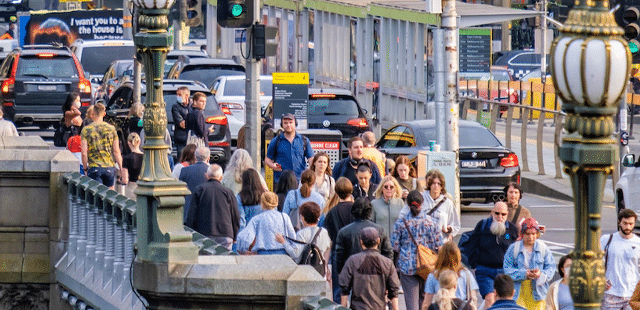
Elspeth Kernebone
6 November 2021
After months of isolation Victorians have flocked back into public spaces, and the homes of those we love. But even as vaccination rates rise, the state has continued to record hundreds of new cases daily. As more people are infected, more continue to die from COVID-19.
So, is it morally acceptable to reopen our society if it means continued spread of COVID-19, and continued death from the virus?
Experts say the ethics of the situation are not straightforward, whichever way you look at it.
Denise Cooper-Clarke – like everyone else – was delighted when she heard lockdown was ending. But when the medical ethicist thought about what it could potentially cost, it was sobering.
With cases in the thousands even during lockdown, people were already dying from COVID-19. But the question for Dr Cooper-Clarke was about the number of people who would die because the state reopened. Would it be more than what was already occurring?
In the short term, health workers have braced themselves for more hospitalisations, intensive care admissions, and deaths.
But Dr Cooper-Clarke said long term, things were less certain.
She said even with modelling, no one knew how long the pandemic would last, or whether a new variant would emerge, possibly more deadly, more contagious, or vaccine resistant.
On the other hand, new therapies might be developed, and Victoria would also potentially reach a very high vaccination rate, she said.
Dr Cooper-Clarke said that the question was tricky, even from a philosophically utilitarian point of view. In this framework, what is ethical is determined by weighing up the relative harms and relative benefits.
This stance had been put forward a number of times over the past 18 months, but even within this framework there was a basic difficulty weighing up the balance of harms which could not easily be compared to each other, Dr Cooper-Clarke said.
But she said for Christians, ethics was not based on this purely utilitarian calculation of harms and benefits. It also invoked principles and virtues, such as loving your neighbour.
While they might not be dying, our neighbours were suffering because of lockdown. So Dr Cooper-Clarke said, the question was, “Which course of action is more loving?”.
For her, this was where a Christian ethic’s strong principle of respect for human life became important, as it considered each human life precious, including those of people who were elderly, sick, disabled, or chronically ill: all at more risk from COVID.
“As Christians we’ll probably give more weight to [these people’s] deaths than a purely utilitarian approach would. In fact many Christians see Christian ethics as involving prioritising rather than discounting the needs of the most vulnerable,” Dr Cooper-Clarke said.
“But even this is not purely straightforward, because the most vulnerable in our society, the disadvantaged, the disabled, and those with mental illness, and those who live with few social supports, are also the ones who suffer the most from lockdowns. So they kind of lose both ways.”
But Dr Cooper-Clarke pointed out that society made decisions similar to reopening all the time. She said in situations such as the road toll, we accepted a lot of death and injury on the road that could be prevented if people stopped driving. But she said, society didn’t ban driving, because people wanted the freedom and benefits that came with being able to drive.
For Dr Cooper-Clarke, the challenge when considering reopening was that the net benefits and harms were incommensurable, that is, there was no easy way to compare them.
On a personal scale Dr Cooper-Clarke said it was important Christians recognised it was their responsibility to minimise the risk of COVID-19 deaths in their circle. She said this meant getting vaccinated and encouraging others to do the same.
For churches, caring for the vulnerable might also mean being stricter than the government prescribed, she said. This might involve offering small, vaccinated-only services for people who were fully vaccinated but still vulnerable, she said.
She said it also meant protecting the unvaccinated, who were also vulnerable.
Public health physician Nathan Grills agreed that more deaths from COVID-19 seemed inevitable. But he said it was hard to ignore the huge utilitarian benefit of reopening for most of Victoria’s seven million residents.
Like Dr Cooper-Clarke, Professor Grills said it was hard to compare easily countable deaths with the hidden toll of lockdown on many people’s lives.
As a Christian and a doctor, Professor Grills’ key concern was that the state protect the vulnerable and the marginalised as it reopened.
Professor Grills said it came back to the effectiveness of the immunisation program in targeting groups at higher risk of severe COVID-19, or who were vulnerable in other ways. He said groups such as people with a disability, or people from non-English speaking communities, needed intentional communication with information about vaccines.
Professor Grills said churches needed to work with groups who were disadvantaged, and with those they were connected to.
So, he gave the example of church-run disability service providers. He said they needed to ask how they could work closely with people at high risk, to make sure they were connected to the system and aware of the dangers.






